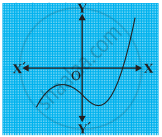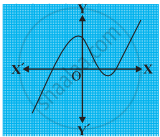Advertisements
Advertisements
Question
If ∝ and β are the zeros of the polynomial f(x) = `6x^2 + x - 2 `find the value of `(∝/β+∝/β) `
Solution
By using the relationship between the zeroes of the quadratic polynomial.
We have
Sum of zeroes=`(-("Coefficent of x"))/("Coefficient of" x^2)` and Product of zeroes = `"Constant term"/("Coefficient of" x^2)`
∴ 𝛼 + 𝛽=`-1/6` and 𝛼𝛽 =`-1/3`
Now, `∝/β+β/∝=(∝^2+β^2)/(∝β)`
`= (∝^2+β^2+2∝β-2∝β)/(∝β)`
`=((∝+β)^2-2∝β)/(∝β)`
`=((-1/6)^2-2(1/3))/(1/3)`
`=(1/36+2/3)/ (1/3)`
`=-25/12`
APPEARS IN
RELATED QUESTIONS
The graphs of y = p(x) are given in following figure, for some polynomials p(x). Find the number of zeroes of p(x).

The graphs of y = p(x) are given in following figure, for some polynomials p(x). Find the number of zeroes of p(x).

Find the zeroes of the polynomial `x^2 + x – p(p + 1) `
If one zero of the quadratic polynomial `kx^2 + 3x + k is 2`, then find the value of k.
If 1is a zero of the quadratic polynomial `ax^2 – 3(a – 1)x – 1`is 1, then find the value of a.
The number of polynomials having zeroes as -2 and 5 is ______.
The zeroes of the quadratic polynomial x² + 1750x + 175000 are ______.
If f(x) = 5x - 10 is divided by x – `sqrt2`, then the remainder will be ______.
If α and β are the zeroes of the polynomial x2 – 1, then the value of (α + β) is ______.
The zeroes of the polynomial 3x2 + 11x – 4 are ______.
